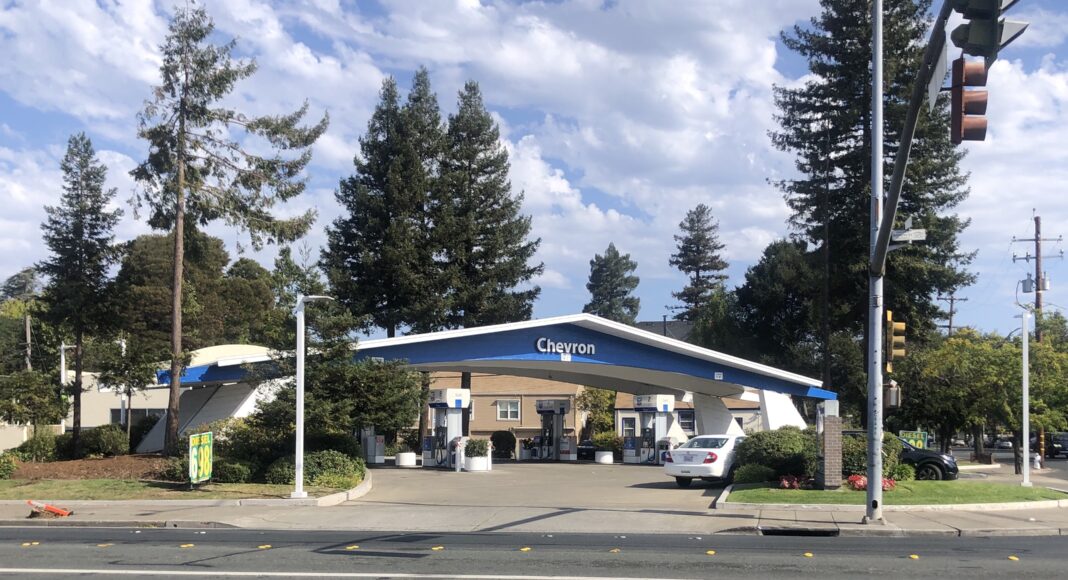Last week, the Santa Rosa City Council followed the lead of four other Sonoma County cities in banning the construction of new gas stations.
The movement, led by the local advocacy group Coalition Opposing New Gas Stations (CONGAS), started to pick up steam last August, when the Petaluma City Council approved the policy, making the city the first in the country to do so.
Since then, Sebastopol, Rohnert Park and Cotati have also passed similar policies, meaning that five of the county’s nine incorporated cities have axed future gas stations. More dominos may soon fall: The Windsor Town Council is set to consider a ban at a Sept. 9 meeting, and the Sonoma County Board of Supervisors has instructed staff to draft a countywide policy restricting new gas stations.
The Santa Rosa council’s 6-0 vote approving the policy makes it the largest city in the country to pass such a ban. Supporters argue that, at a time of climate crisis, cities should not allow additional investment in fossil fuel infrastructure and instead should shift their focus to supporting electric vehicle charging stations and other lower-emission alternatives.
“The transportation sector accounts for approximately 60% of [greenhouse gas] GHG emissions in Sonoma County. The City must reduce fossil fuel consumption by increasing transit ridership, biking, and walking; and replacing fossil fuel powered vehicles with electric and other alternatively powered vehicles,” a city staff report states.
Gas stations certainly won’t disappear overnight. Santa Rosa currently has 44 stations, plus two more in the planning pipeline, which will be exempted from the new policy.
In mid-2021, there were about 11,500 electric vehicles in Sonoma County, according to the Regional Climate Protection Authority (RCPA), the climate-focused division of the county’s transportation authority. The RCPA has set a goal of 100,000 electric vehicles in the county by 2030, which would require building a significant number of charging stations quickly.
There’s also an equity argument. According to the staff report, all but three of the 44 gas stations within Santa Rosa’s city limits are located in areas “that have been identified as having the highest concentration of people of color and people living in poverty,” exposing those residents to the negative environmental impacts related to gas stations, including air pollution and contaminated ground.
Last week, the Santa Rosa City Council followed the lead of four other Sonoma County cities in banning the construction of new gas stations.
The movement, led by the local advocacy group Coalition Opposing New Gas Stations (CONGAS), started to pick up steam last August, when the Petaluma City Council approved the policy, making the city the first in the country to do so.
Since then, Sebastopol, Rohnert Park and Cotati have also passed similar policies, meaning that five of the county’s nine incorporated cities have axed future gas stations. More dominos may soon fall: The Windsor Town Council is set to consider a ban at a Sept. 9 meeting, and the Sonoma County Board of Supervisors has instructed staff to draft a countywide policy restricting new gas stations.
The Santa Rosa council’s 6-0 vote approving the policy makes it the largest city in the country to pass such a ban. Supporters argue that, at a time of climate crisis, cities should not allow additional investment in fossil fuel infrastructure and instead should shift their focus to supporting electric vehicle charging stations and other lower-emission alternatives.
“The transportation sector accounts for approximately 60% of [greenhouse gas] GHG emissions in Sonoma County. The City must reduce fossil fuel consumption by increasing transit ridership, biking, and walking; and replacing fossil fuel powered vehicles with electric and other alternatively powered vehicles,” a city staff report states.
Gas stations certainly won’t disappear overnight. Santa Rosa currently has 44 stations, plus two more in the planning pipeline, which will be exempted from the new policy.
In mid-2021, there were about 11,500 electric vehicles in Sonoma County, according to the Regional Climate Protection Authority (RCPA), the climate-focused division of the county’s transportation authority. The RCPA has set a goal of 100,000 electric vehicles in the county by 2030, which would require building a significant number of charging stations quickly.
There’s also an equity argument. According to the staff report, all but three of the 44 gas stations within Santa Rosa’s city limits are located in areas “that have been identified as having the highest concentration of people of color and people living in poverty,” exposing those residents to the negative environmental impacts related to gas stations, including air pollution and contaminated ground.
Santa Rosa’s move aligns with a state decision last week to phase out the sale of all new gas-powered cars by 2035.











